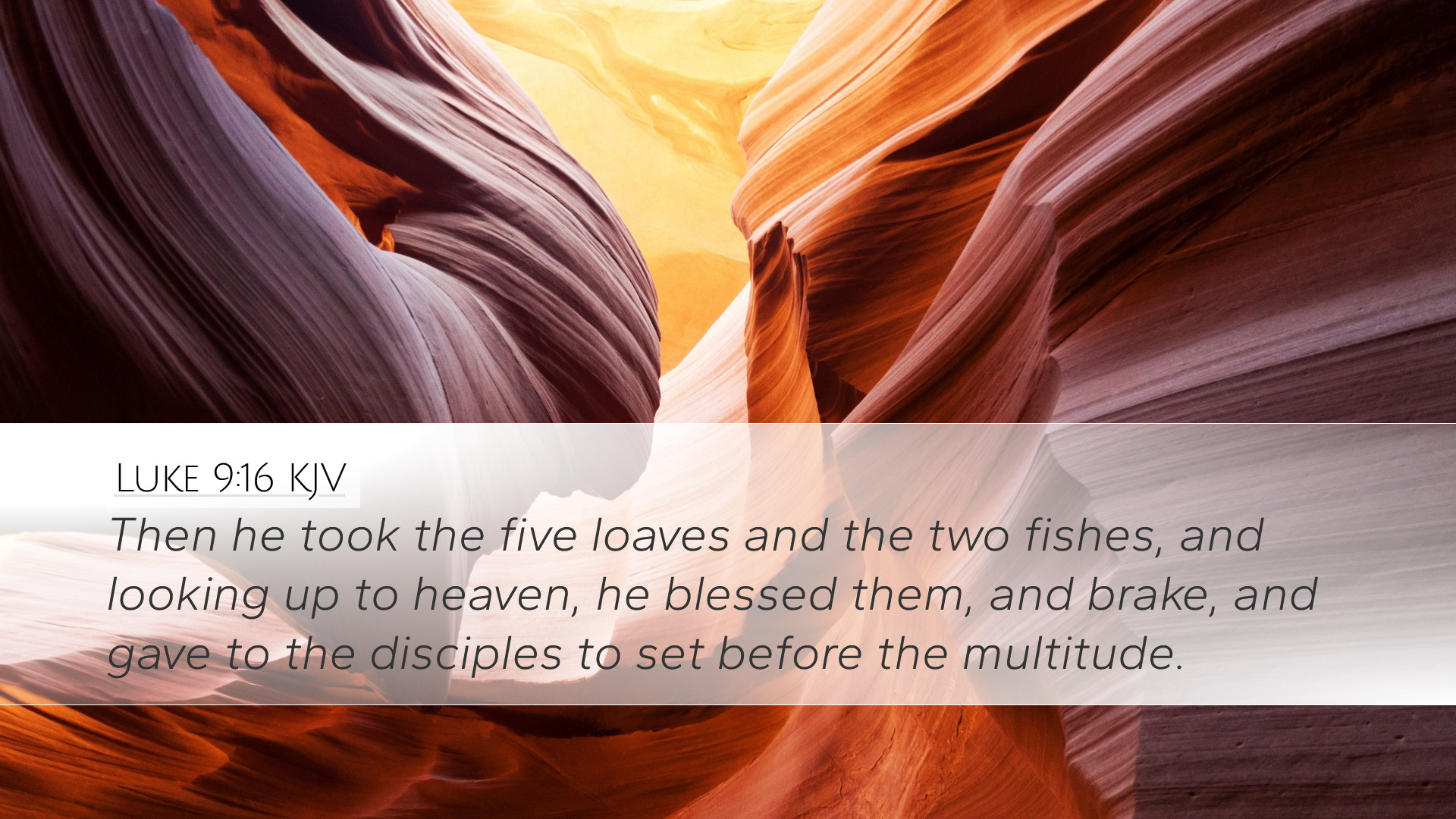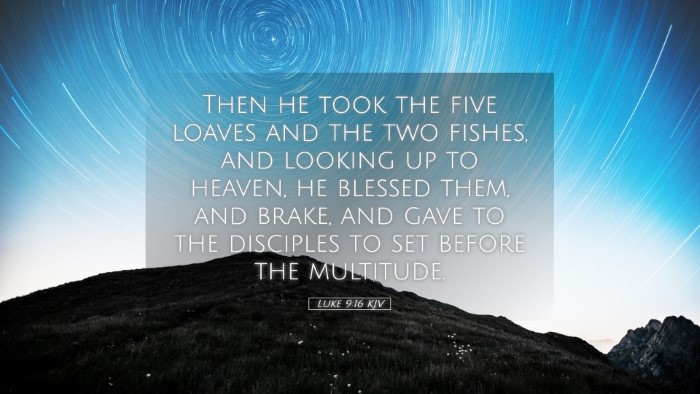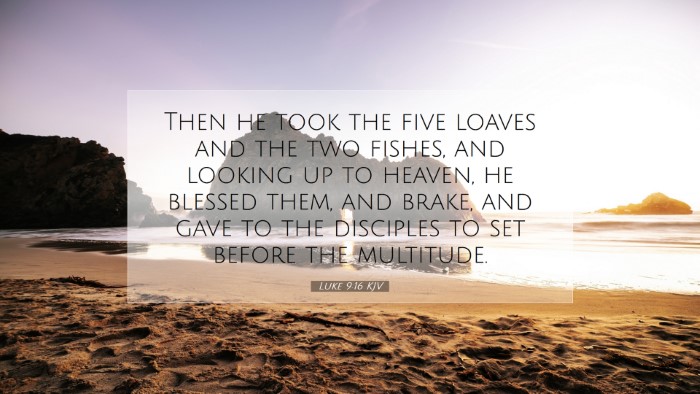Commentary on Luke 9:16
Luke 9:16 states:
"And he took the five loaves and the two fish, and looking up to heaven, he blessed them, and brake, and gave to the disciples to set before the multitude."
Introduction
This verse is part of the account of the feeding of the 5,000, a significant miracle that demonstrates both the compassion of Jesus and His divine authority over creation. The passage captures the essence of Christ's ministry, His reliance on the Father’s provision, and His ability to multiply resources for His people. Commentaries from various theologians provide insights that explore theological, practical, and pastoral applications of this verse.
The Significance of the Five Loaves and Two Fish
Matthew Henry emphasizes the humility of the resources offered to Christ. Five loaves and two fish represent a meager provision, suggesting that even the smallest offerings can be used by God. This serves a dual purpose: it highlights our human limitations while showcasing God’s limitless power. Henry notes that Christ does not overlook what little we offer; instead, He magnifies it for His purposes.
Albert Barnes also points out that the disciples were likely distressed by the inadequacy of these resources in face of such a crowd. However, he highlights that it is not the amount of what is available that matters but the attitude with which we present it to Christ. This serves as a reminder that faith in action requires us to bring our limited resources before God, trusting Him to multiply and use them effectively.
Adam Clarke adds that the mention of loaves and fish signifies the basic needs of life, suggesting that God cares for our physical sustenance. This miracle illustrates God's concern for both spiritual and physical nourishment, indicating that He provides for His people in their time of need. Clarke's insights encourage believers to present their needs before God with the assurance that He is indeed the provider.
The Act of Blessing
The act of Jesus looking up to heaven and blessing the food is rich in significance.
- Matthew Henry interprets this as a model for prayer, suggesting that we should always look heavenward when we seek blessings. Jesus demonstrates dependency on the Father, showing us that we must acknowledge God's sovereignty and provision in our lives.
- Albert Barnes elaborates on the importance of thanking God for provisions. His commentary insists that gratitude is essential in the life of a believer, and we must regularly acknowledge God's goodness for His unseen handiwork in our lives.
- Adam Clarke associates this blessing with the Jewish tradition of thanking God prior to meal consumption. This act not only sanctifies the meal but also connects the act of eating to divine worship, reminding believers to view every provision as a blessing from God.
The Process of Breaking and Distributing
Matthew Henry expounds upon the act of breaking the bread, seeing it as a symbol of sacrifice. He connects this event to the Last Supper, linking the physical provision to spiritual significance. The breaking of bread in communion reflects the ultimate provision of Christ’s body for the redemption of mankind.
Albert Barnes emphasizes that such an act of breaking and distributing indicates organization within the ministry. The disciples were involved in the distribution, which speaks to their role as God's servants. This lesson is pertinent for pastors and leaders who are called to involve their congregations in ministry work.
Adam Clarke highlights the importance of teamwork in ministry exemplified in this moment. The distribution of food by the disciples shows that evangelism and care for others often require collaboration and shared responsibility within the body of Christ. This act of serving points towards the commission of believers to participate in Christ's ministry.
Lessons for Ministry
This verse from Luke provides profound implications for contemporary ministry:
- Faith in Provision: One of the core lessons is the necessity of bringing our limited resources to God. Just like the loaves and fish, our abilities and resources may appear minimal, yet when placed in Christ’s hands, they can be multiplied for His glory.
- Prayer and Gratitude: The act of blessing teaches the importance of prayer in our ministries. Leaders are reminded that dependency on God through consistent prayer is critical for success and fruitfulness. A heart of gratitude should permeate all aspects of ministry.
- Involvement in Ministry: The engagement of the disciples during the feeding demonstrates how every believer is called to participate in the work of the Kingdom. This involvement fosters community, empowerment, and discipleship within the church, reminding us that the work of the Gospel is a collaborative effort.
Pastoral Applications
For pastors and church leaders, Luke 9:16 serves as a source of encouragement and practical instruction.
- Empowerment of Church Members: This passage should encourage pastors to empower their congregations, allowing them opportunities to serve and engage in ministry work, recognizing that God can work through their efforts.
- Modeling Dependency on God: Pastors should exemplify dependence on God in all circumstances, openly giving thanks for God’s provisions and seeking His direction in ministry decisions.
- Encouragement in Times of Scarcity: In times of difficulty or scarcity, church leaders can find strength in knowing that God specializes in taking what little we have and using it for His astounding plans.
Conclusion
Luke 9:16 encapsulates the principles of faith, dependence on God, and active ministry engagement. Through the insights of public domain commentaries, this verse not only highlights the miracle of provision but also calls believers to a deeper understanding of God's radical capability to transform our inadequate offerings into more than enough. As such, it remains a cornerstone for reflection, application, and inspiration for pastoral work, personal growth, and theological exploration.


